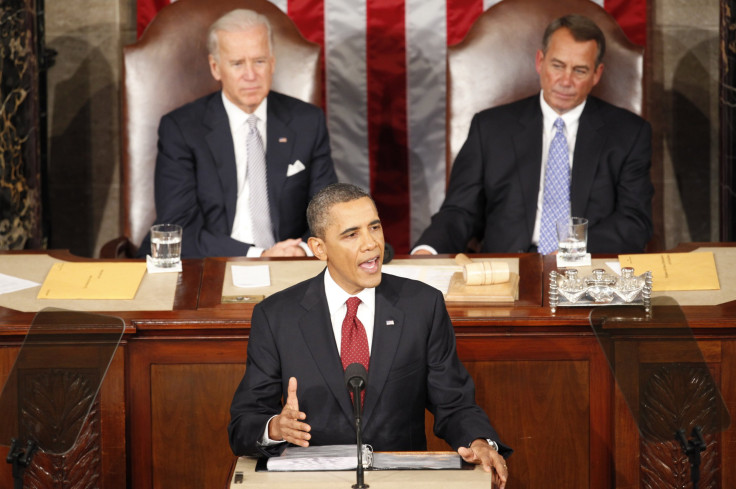Obama's Secret Plan For Republican Support In A Second Term

Moments of candor (or "gaffes," as the regrettable ones are called) are rare in the rigorously scripted, poll-tested world of presidential campaigns.
So a newly released transcript of the Des Moines Register's interview with President Obama affords an uncommon glimpse into the candidate's reasoning about the accomplishments of his first term and his prospects for a second.
The campaign initially requested that the interview be off the record, prompting the Register to question why the content of the interview had to be secret. The Obama campaign has since reversed course and released the transcript.
Given the fact that the interview was initially beyond the record, the president was able to expand beyond some familiar debate-and-stump-speech talking points (reviving the auto industry, arresting the economy's free fall, the Race to the Top education initiative, investing in new forms of energy).
"Since this is off the record, I'm going to be blunt," Obama said at one point.
Here are some of the more interesting points:
On Republicans
President Obama has faced unified Republican opposition at virtually every turn, epitomized by Senate Minority Leader Mitch McConnell's now-infamous statement that his party's highest priority was denying Obama a second term.
In his interview with the Des Moines register, Obama referred to the Republicans' intransigence when he was asked about the frequent criticism that he invested too much political capital in pursuing health care reform, rather than focus on more economic measures.
But Obama said the will for more economic measures was simply not there. After the $789 billion stimulus package, the bailout of the banks and his move to rescue the auto industry, Obama said, "there was not going to be any appetite among Democrats or Republicans to take additional actions until we saw progress" on the economy.
He also defended the Affordable Care Act as a response to a pressing economic issue, noting that health care spending consumes one-sixth of the economy. But he discounted the notion that, had he pursued something other than health care, Republican cooperation would have been forthcoming.
"The suggestion somehow that if we hadn't pursued Obamacare, somehow we would have gotten additional stimulus from the Republicans, for example, that we could have primed the pump more, that's just not borne out by any of the evidence," Obama said.
And the Republican party's scorched-earth tactic of rejecting the president at every turn will hurt them in the long run, Obama predicted.
"Now, it was a political strategy that won them back the White House, but it wasn't good for the country," Obama said. "And I think the country recognizes that."
Taxmageddon Leverage
Should he win a second term, Obama said, there is hope for breaking the partisan stalemate. The confluence of massive year-end budget changes known alternately as the "fiscal cliff" or Taxmageddon will force Republicans to negotiate, Obama suggested.
"In the short term, the good news is that there's going to be a forcing mechanism to deal with what is the central ideological argument in Washington right now, and that is: How much government do we have, and how do we pay for it?"
A couple different things are set to happen. The Bush-era tax cuts are set to expire, resulting in a massive tax hike -- Obama wants to keep in place most of the cuts but rescind those on high earners, something Republicans have resisted. And the first stage of a decade-long, trillion-dollar spending cut known as the "sequester" will kick in. The sequester, to be evenly distributed between defense and domestic spending, occurs because the deficit-cutting "super committee" -- forged to resolve last summer's debt ceiling fight -- could not find a deal.
With those looming changes representing a potentially cataclysmic blow to the economy, Obama said, "I believe in the first six months we are going to get a deal."
"It will probably be messy," Obama said. "It won't be pleasant. But I am absolutely confident that we can get what is the equivalent of the grand bargain I've been offering to the Republicans for a very long time."
Immigration
That confidence extends to the president's prospects with Latinos. Hispanic voters account for a substantial part of the electorate in several swing states, and polls show Obama far ahead of Romney among Latino voters. That advantage, Obama said, would be the decisive factor if he secures a second term.
"Should I win a second term, a big reason is because the Republican nominee and the Republican Party have so alienated the fastest-growing demographic group in the country, the Latino community," Obama said.
Obama and his Democratic allies are not the only ones predicting this. Former Florida governor Jeb Bush has exhorted his party to soften its immigration platform, and Mitt Romney -- who during the Republican primaries aligned himself with immigration hard-liners pushing tough new state laws like Arizona's controversial SB 1070 -- admitted to donors months ago that the Republican party's struggles with Latinos "spells doom" come election day.
Despite his substantial Latino advantage, Obama still faces considerable frustration from allies who say he has reneged on his 2008 campaign promise to pursue comprehensive immigration reform (the fact that Obama has deported a record number of immigrants does not help). But Obama has often said his failure to tackle immigration stems from Republican resistance, and he told the Register that an election drubbing would bring Republicans to the table.
"I am fairly confident they are going to have a deep interest in getting that done," Obama said, later adding that he was "fully committed" to the issue.
© Copyright IBTimes 2024. All rights reserved.




















